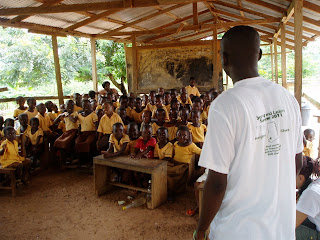My mom and dad are farmers, and have eight children: five girls and three boys. I am the third born and the eldest girl. Two of my siblings live in Bibiani, but the rest are in Kojina. I attended school at Humjibre Anglican Primary and Anglican Junior High School (JHS). My father attended school, but my mother never did. The children before me were not able to complete JHS. I completed Senior High School (SHS) at Asankragewa in 2006. I was the first in my family to attend SHS. I was good academically, so all my [effort] was towards completing SHS and even pursuing tertiary.
When I was young, I wanted to be a nurse. In SHS, I did science. But this teacher discouraged me from doing science and convinced my parents that I should switch to Business. He said I was not smart enough because “science is designed for the boys.” Out of 52 students in science, only 10 were girls, but I was ranked 3rd in the class overall. However, because of this teacher, my parents switched me to Business just before my second year. It happened at the last minute, so I when I came for the first day of school, I did not even know I had been switched. When I joined the Business class, they nicknamed me “Kaakyire” which means “last-born” because I had been switched at the last minute and everyone else had been in the class since the first year.
When I completed SHS, my father became ill and was not able to get money for me to continue my education. So, I taught at a private JHS about one hour from Bekwai. I taught there for two years, and then I stopped because my supervisor was not attentive and we were not getting paid, so I stayed with my grandparents at Bibiani. In 2009, I heard from my father about GHEI advertising for a teacher, so I came back here to apply and I got the job in February 2010.
In the beginning, before he fell sick, it was my father who motivated me. He encouraged me and was very involved in my education. When it comes to reading and writing everyone would come to my father. Even the SHS students would come to us—my father and I—for help. My aunt in Bibiani was the first woman from my family to enter University, so when I was in JHS they would always compare me to her. Now she is head of Internal Revenue Service at Accra, and she is very successful. So this comparison also motivated me even though I never met her in person.
At GHEI, I teach
ECL students who are slow learners in primary 1 and 2. I also teach math and English for the
YEP program. I like teaching YEP math and English because the students are older and usually very motivated, so I find it enjoyable to teach them.
I have learned so many new things at GHEI especially when it comes to computers. Although I was teaching before, I learned from GHEI how to speak in public, even in front of dignitaries. GHEI has a new approach to teaching, so I have learned new ways of lesson planning and of teaching. We also have regular teacher training meetings where we work together to constantly improve our programs. We teachers are always learning too.
I also feel great about
Girl’s Empowerment program at GHEI. Let me give myself as an example: When I completed JHS, my grades were good enough for SHS but my father’s friend tried to discourage him from sending me to school because I am a girl and the only way I could produce was through childbirth, not education. We’ve noticed nowadays that women can also work and get the same positions as the men. What men can do, women can also do. So Girls Empowerment exposes girls like me to this idea and encourages education.

Many people here believe men are more intelligent than women by nature. When teaching, you see only the boys participating. In my classes, I introduced a new concept: when I pose a question to the class, I alternate between calling on boys and girls to answer. If a boy answered the last question, then a girl must answer this one. I do it to prove to them—boys and girls—that they can perform equally. The boys have also learned something. They were over confident in their education, but now, we have thrown a challenge to the boys that we can compete. Now we are saying, ‘What you can do we can also do; we can even do it BETTER.’
During my classes with the girls, I saw that the girls were not coming. Some said that they were helping in the house. So I even compared them to Diana [Rickard, GHEI Executive Director and US-based Pediatrician], because she was also once a small girl. I asked them: “Do you think a man could do all this? She did a lot here to create GHEI so it proves that a woman can do a man’s work even better than a man.” And I saw them slowly come around.
In the next ten years, I hope more people will attain higher careers and more will complete SHS. SHS will open up so many opportunities. You will see girls attaining higher positions like teaching positions at private schools because they require an SHS certificate. This community will be the top performing community of the district when it comes to education with the help of
GHEI.




























